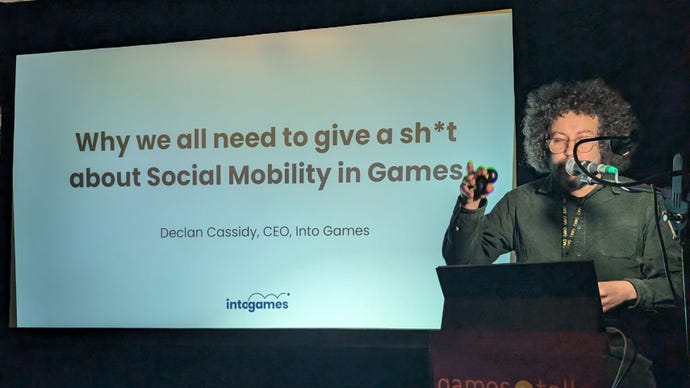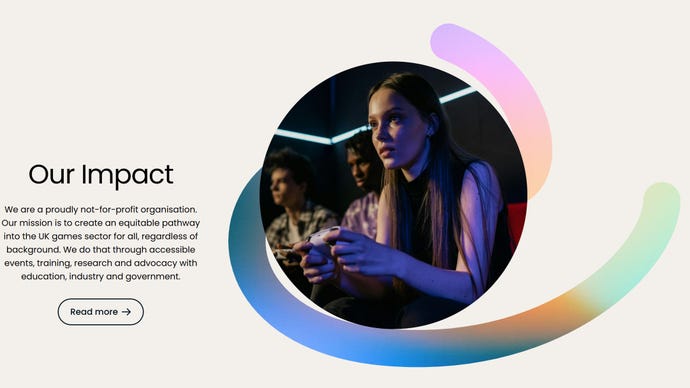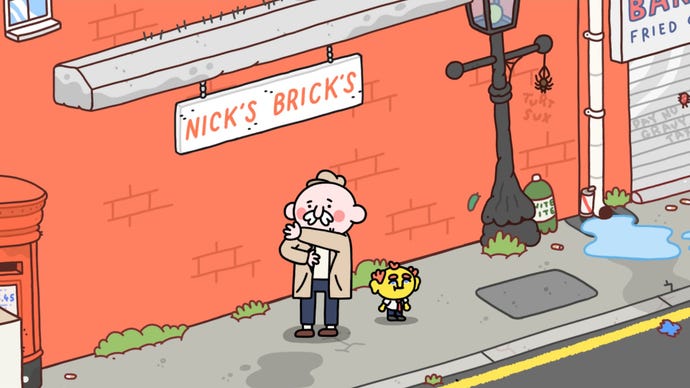“Last year we ran a big games careers festival in Downham, on the border of Lewisham and Bromley in London, in a leisure center in the heart of a very deprived community that hasn’t seen anything like this in that space,” Into Games CEO Declan Cassidy tells me over a call. A UK-based non-profit focused on enhancing social mobility in the UK games sector, Into Games reported last year that, in terms of socioeconomic access, game development has one of the worst records “of any creative or technical sector”.
2022’s UKIE census found that only 13% of UK games professionals are from working class backgrounds, a figure Cassidy has said would be closer 37% if it reflected society as a whole. It’s a complex issue, but Cassidy’s work starts in a simple place: letting working class young people understand that there’s a place for them in games to begin with.
“There’s that famous thing: you can’t be it until you see it,” Cassidy says, “If you can’t see these roles, then you’re not going to even aspire [to them]”. Into Games brought eight big names to Downham, including Ubisoft, Rocksteady and Splash Damage, alongside local colleges and universities. 500 local young people turned up and took part in one-to-ones with 50 sector professionals, “which then meant they could see career pathways for themselves.”

“People from these backgrounds are central to the kind of work that we’re doing going forward,” Cassidy says. “You can run this kind of stuff at a kind of shiny, glitzy place in the center of a city, or a big university. But often there are certain people that just don’t leave their area, you know, because they feel comfortable there, because they feel safe there, because their families and friends are there. So it’s really important to bring this stuff to them and to those communities, to get the kind of visibility that we need. To get these people to understand that there’s a place for them in the sector”.
Even if you’re from outside the UK, you’re probably still aware of the UK’s famously byzantine, crusty, and somewhat arbitrary norms around ‘class’. That 13% figure from the UKIE report uses the term “semi-routine / routine” – things like manual labour, as distinct from managerial work. A caretaker. A waitress. A factory worker.
“Working class is really what your parents did,” says Cassidy. “It’s not necessarily anything to do with income. It infers low income just by what those kind of working positions are. But it can, in essence, be a little bit clumsy in its more broad use”. They often use the term “under-resourced” as a more accurate reflection of the place between low income and working class. “Working class doesn’t necessarily mean low income.”
The sort of social mobility problems Into Games aim to tackle with events, research, courses and bursaries for training, networking and equipment aren’t necessarily unique to games. “It’s small for the entire creative sectors. Not just the creative sectors, it’s also small for any of the major professional sectors,” says Cassidy. But the UK games industry does present a unique circumstance: the pipelines into many of those other roles aren’t filled with people from working class or low income backgrounds to begin with. “Whereas the pipeline for games roles, it kind of is. We haven’t got an issue with attracting people into games roles at all.”
“People from working class and low income backgrounds are not only financially poor, but often time poor as well.”
The issue, says Cassidy, is the challenges under-resourced people face in the last mile. The place between graduation and actually landing work. “People from working class and low income backgrounds are not only financially poor, but often time poor as well,” Cassidy says. He estimates that around 6000 yearly graduates are competing for “maybe 500 at a push” yearly entry level roles. “It doesn’t take a maths genius to work out that there’s a serious competition issue that happens at that late stage.”
“You can see a situation whereby you’ve got a bunch of people from working class and low income backgrounds who’ve overcome lots of challenges along the way,” whether that be holding down a job alongside study, or having to return home to care for family. For “their more well-resourced peers,” – those who didn’t have time taken from study, who had access to a good PC and time to work on their portfolio – “naturally, those pieces of work are going to be better. Those people have more time to network, have more time to meet people and create their own opportunity”.
It’s not through lack of talent or willingness, either, says Cassidy. “It’s just that, ultimately, it’s also about finding the best talent for a role. Which it kind of should be, right? But I think hand in hand with that comes the importance of creating equity to find those best people. Those best people are there, but they could be hidden by a range of factors that are completely out of their control. So it’s about: how do you try and eliminate those factors that are essentially hiding the best talent.”
And it’s also not that the industry doesn’t want to create these opportunities in the first place. Just 4% of people from the sector polled for Into Games’s 2024 report felt like enough was being done to address the imbalance. “As equally brutal as it can be when it comes to careers and work – we’ve certainly seen that happening with the layoffs over the last few years – I think once you strip away the kind of ‘company’ from that, you have the people,” Cassidy says. “And the people within it are often very kind, very open, very willing to want change and to do the best possible thing.”

But beyond this, there’s still the 25,000 layoff-sized elephant in the room. Background aside, is it helpful – or even moral – to encourage anyone to take an entry level job in an industry that’s rapidly shedding even established talent? Does Cassidy ever feel like answering “how do I get into games” with “don’t”?
Recently, Cassidy received a message from a “long term lead creative at a game studio” – someone who’s had a long career in games. “Don’t get me wrong. I’m not saying this in a bad way. But you guys are called Into Games. You do all this work. Have you ever considered doing something called Out Of Games. Tell people about other places they can go?”.
“It struck a chord with me,” Cassidy says. “We’ve talked about it internally. You look at all these stats pilling up, at how solid a job in the sector might be at the moment. You look at how hard it is to get in – the high bar to entry in terms of quality, the level of competition. You go: okay. Should we be encouraging people?”
“And the place I got to with it was: there are some big positives here as well, right. We know that going to university is the biggest factor in creating a more socially mobile society. It’s the biggest thing that you can do to, in effect, get a better job than your parents. We can say, okay right, not all these people are getting jobs. But they’re going to university. They’re developing a whole range of skills which will give them jobs elsewhere”.
Game skills, Cassidy says, are also being utilised more in other sectors. “That’s not going away, that’s just ramping up. If a game job at the end is the definition of success here, then you know, maybe not. But, if we’re looking more broadly – the employability of someone, their social mobility as they go forward, their skills and confidence as an individual – then there’s still nothing wrong with going down that route.”

Cassidy admits that their 2024 report was, in some ways, “quite cold hearted. It kind of says that we can’t help everyone. The games sector can’t help everyone. There isn’t a role for everyone in games. It still has to be someone that’s really committed and willing to put the time and energy in to become absolutely excellent at their craft, whatever background they’re from. There’s still a gap there, but that’s quite an easy gap to solve. A bit of cash, a bit of equipment, and more opportunity on the other side”.
Next Wednesday, April 9th, Into Games are running a day long workshop as part of the London Games Festival, aimed at helping 16 to 21 year olds discover creative careers in games. Among the speakers are staff from Gears Tactics studio Splash Damage and Riot Games, alongside things like portfolio Q&A sessions.
What Cassidy enjoys most about these kinds of events, he says, is that they don’t “just come in and kind of dictate from upon high”. For the Downham careers fest, “It was something that we worked with the local council and then grassroots youth and careers organizations on the ground to help create. The actual thing was run by volunteer young people on the ground”.
“If you’re not drawing from an experience that you know a large majority of your player base are experiencing, then you’re missing out as a game developer.”
But as Cassidy has said: at the end of day, talent still matters. Whatever the industry could be doing to help under-resourced people, it’s about what those people can offer the industry too. There’s that underutilised talent pool, of course. But it also just means better stories.
“There’s a large number of people in society from working class and low income backgrounds, right? So it makes sense that you want to be including them in the cultural mediums that you create, whether that’s the characters or the look or feeling, or just the way that people talk, what they’re saying, or their background. Because it’s going to make for more powerful player experiences. If you’re not drawing from an experience that you know a large majority of your player base are experiencing, then you’re missing out as a game developer.”

I mention how refreshing it felt, playing Heaven’s Vault, to hear protagonist Aliya speak in an accent similar to my own and the people I grew up with in an economically deprived Essex seaside town – an accent I’d only really heard in games from orcs and bandits. He mentions Thank Goodness You’re Here!. “A modern title that comes clearly from a very regional, working class experience, that’s telling that kind of story in a really authentic way that’s also fun and interesting.”
There’s a whole wealth of this stuff, says Cassidy, that can be applied to games that we’re missing out on. He mentions an anecdote from their 2024 report. “Somebody who’s really high up in the industry as an artist,” from a very poor family, talking about how they’re only doing what they’re doing now because GoldenEye studio Rare took the time to reply to a letter. “They sent them a little bit about careers in the sector, a little brochure about Rare. And just said ‘keep going’. That person was like, that was just what I needed at that time. I would 100% not be doing this if it wasn’t for that letter”
The best way to support Into Games’s work, says Cassidy, is through the Slow Game Club – a subscription based monthly book club for games with a Discord community for discussing them afterward. They’re currently running a Noir & Mystery theme.
Source link











Add comment